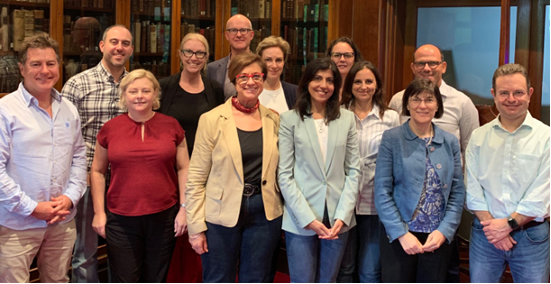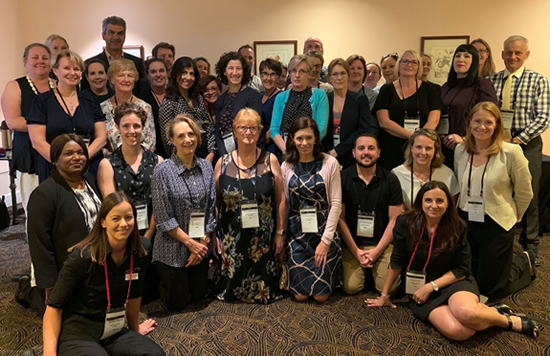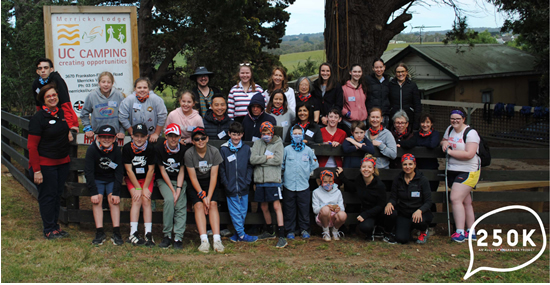March 2020
It has been a very busy start to the year! We have already held two stakeholder meetings and visited politicians in Canberra.
The first stakeholder meeting was to discuss the development of minimum standards for drug allergy De-labelling. 'De-labelling' is a term used to describe the process of confirmation of a drug allergy or not (e.g. penicillin). Many people are thought to be allergic to a drug (‘labelled’ allergic) and it is important to be able to confirm their allergy so that they don’t need to avoid some medications unnecessarily (de-labelled). The development of the minimum standards will help ensure patient safety during labelling/de-labelling processes.
Drug Allergy Stakeholders' Meeting

The second stakeholder meeting was held to discuss minimum standards for the prevention and management of anaphylaxis in schools and early childhood. There was representation from across Australia from both the public and private school sector and early childhood education and care (ECEC) both state and nationally. This was the first stage of engagement with key stakeholders and we look forward to continuing to progress this work.
School and Early Childhood Education and Care Stakeholders' Meeting

Other project updates include:
Food allergy prevention project (Nip allergies in the Bub)
We continue to make good progress with the Nip allergies in the Bub website and resources. An article about SmartStartAllergy, one of the tools used to encourage parents to feed babies the common allergy causing foods in the first year of life, was published in the February issue of the Medical Journal of Australia. This is a great achievement and will help promote the use of SmartStartAllergy in general practice. Our hope is that more GP surgeries nationally will utilise the SmartStartAllergy initiative.
This month we will also be promoting the Nip allergies in the Bub project at an allergy meeting being held in Philadelphia.
250K youth project
Last year ended with a successful 250K youth camp at Merrick’s Lodge in Victoria. We managed 28 different food allergies over 3 days and had a great time helping teens and young adults learn more about how to manage their food allergies. A highlight of this camp was the peer mentor training we held the day before the camp. We have a great group of peer mentors who have really taken this role seriously and have been great with helping the younger teens to manage their allergies. Visit the 250K website to view the photo gallery: www.250k.org.au

We have continued to hold chat forums with teens and young adults. We held a catch up with our peer mentors and also held a camp catch up earlier in the year. The chat forums help us to stay connected with teens and young adults and form an important part of our peer mentor program. We plan to build the chat sessions so they become a place of learning and sharing for 11-16yr olds with severe allergy.
Food allergy management in food service project
We continue to engage with key stakeholders to help promote the All about Allergens online training. We are currently developing the All about Allergens in Healthcare course which will have two modules – one for food service staff working in healthcare and another for ward staff. Not unlike food service in a restaurant, food allergy management in healthcare is a shared responsibility, often with several key people involved in delivery of appropriate food to a patient/client. We will also be developing supporting resources to help everyone involved in the food chain.
We are also progressing our communication strategy for all food service establishments, which will commence soon through social media. As food allergy management in food service is a shared responsibility, we hope to engage and communicate with consumers, food service providers, environmental health officers and other authorised officers.
Visit the Food Allergy Aware website to find food allergy information relevant for you and your business: www.foodallergyaware.org.au
Shared care model scoping project
We have now completed the shared care model scoping project and submitted the report to the Australian Government Department of Health. As this was a scoping project to help inform the federal government, our report is not available to the public. However, we continue to advocate for the implementation of the report recommendations to help improve access to quality allergy care for all Australians.
We would like to take this opportunity to thank the many consumers, health professionals and health professional organisations who have engaged with the National Allergy Strategy during this project.
My Health Record allergy project
We have a very dynamic working group that is helping us to promote use of My Health Record with regards to allergies. We are developing resources for clinical immunology/allergy specialists to help them utilise My Health Record to provide accurate allergy documentation. We are also helping to educate consumers living with allergies about how to use My Health Record.
Stay informed about the National Allergy Strategy
Follow us on Facebook, LinkedIn, Instagram and Twitter to stay informed or visit the National Allergy Strategy website: www.nationalallergystrategy.org.au

